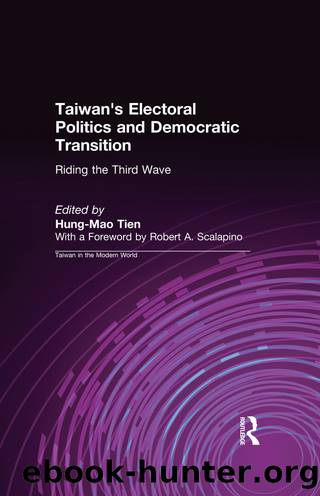Taiwan's Electoral Politics and Democratic Transition: Riding the Third Wave by Hung-Mao Tien

Author:Hung-Mao Tien [Tien, Hung-Mao]
Language: eng
Format: epub
Tags: Ethnic Studies, Public Affairs & Administration, Social Science, Political Science, Regional Studies, General
ISBN: 9781315285795
Google: PIcYDQAAQBAJ
Goodreads: 32205889
Publisher: Routledge
Published: 1995-12-01T00:00:00+00:00
Table 5.2 Ethnic Composition of the Executive Yuan, 1950-34
creased the proportion of Taiwanese full-time cadres and part-time committees in the Service Station and on the county and city committees. The KMT intended to mollify the Taiwanese by recruiting them into the party leadership. To justify its claim of jurisdiction over the whole of China, however, the KMT only allowed the Taiwanization phenomenon to occur at the lower levels of party organization. During the 1950s and 1960s, mainlanders occupied nearly all the higher-level party positions; it was not until Chiang Ching-kuo became premier in 1972 that the tendency to recruit increasing numbers of Taiwanese elites into the central governmental and party decision-making bodies became apparent (Wu 1987, 67-68; Shyu 1990, 192).
The changes in ethnic composition of the members of the Executive Yuan and the Central Committee and Central Standing Committee reflect the overall Taiwanization process. The incorporation of Taiwanese elites into the Executive Yuanâthe highest decision-making body of the governmentâincreased significantly beginning in 1972, when Chiang adopted an "indigenization policy" to recruit more native Taiwanese elites (Table 5.2). The acceleration of Taiwanization proceeded even more dramatically in 1988 after native Vice-President Lee Teng-hui assumed the offices of president and party leader on Chiang's death. An average of 30.8 percent of the Executive Yuan membership was Taiwanese during Chiang's premiership from June 1972 to June 1978. After Li Huan became premier following Lee's assumption of the party leadership post, the proportion of Taiwanese in the Executive Yuan rose to 45 percent. Most significant, in February 1993 a native Taiwanese, Lien Chan, replaced mainlander Hau Pei-tsun as the first Taiwanese premier in the KMT's history on Taiwan.
The proportion of Taiwanese members in the KMT Central Committee did not increase significantly before the convocation of the Eleventh National Congress in 1976. The KMT's deliberate incorporation of Taiwanese elites into the central party decision-making body at that time coincided with Chiang's reelection as party chairman at the end of 1976 (Table 5.3). The Taiwanese representation on the Central Committee increased to 14.6 percent of the 130 members in the Eleventh National Congress and grew to 34.4 percent of 180 members after Taiwanese Lee Teng-hui assumed the position of party chairman in the Thirteenth National Congress in 1988. By the Fourteenth National Congress in 1993, more than halfâ112 of 210âof the committee members were Taiwanese.
During the Reconstruction movement from 1951 to 1952, only one of the sixteen members of the KMT Central Reconstruction Committee was Taiwanese, and there were no Taiwanese Central Standing Committee members before October 1957 (Table 5.4, pages 119â20). The Taiwanese representation in the Central Standing Committee remained low until Chiang Ching-kuo became the party chairman. In the 1970s, Chiang implemented his "indigenization policy," which brought the Taiwanese representation on the Central Standing Committee to 22.7 percent in 1976 and to 45.2 percent by 1986. When Lee became the party leader in 1988, the Taiwanese membership rose to 51.6 percent; it was 57.1 percent in 1993.
The change in the military composition of the KMT's central bodies also reflects the increased democratization within the party.
Download
This site does not store any files on its server. We only index and link to content provided by other sites. Please contact the content providers to delete copyright contents if any and email us, we'll remove relevant links or contents immediately.
Collaborating with Parents for Early School Success : The Achieving-Behaving-Caring Program by Stephanie H. McConaughy; Pam Kay; Julie A. Welkowitz; Kim Hewitt; Martha D. Fitzgerald(897)
Entrepreneurship Education and Training: The Issue of Effectiveness by Colette Henry Frances Hill Claire Leitch(665)
Adding Value to Policy Analysis and Advice by Claudia Scott; Karen Baehler(499)
Materializing the Middle Passage by Jane Webster;(496)
Race and American Political Development by unknow(488)
Sociological Perspectives of Health and Illness by Constantinos N. Phellas(478)
American Government and Politics Today by Steffen W. Schmidt Mack C. Shelley Barbara A. Bardes(475)
Human and Global Security : An Exploration of Terms by Peter Stoett(460)
Control Of Oil - Hardback by Kayal(457)
The Disappearance of Rituals: A Topology of the Present by Byung-Chul Han(398)
Advances in Child Development and Behavior, Volume 37 by Patricia J. Bauer(396)
The Catholic Church and European State Formation, AD 1000-1500 by Jørgen Møller(388)
The World According to China by Elizabeth C. Economy(379)
Theories of Counseling and Psychotherapy: A Case Approach by Nancy L. Murdock(370)
Left Is Not Woke by Susan Neiman(367)
Application of classical statistics, logratio transformation and multifractal approaches to delineate geochemical anomalies in the Zarshuran gold district, NW Iran by unknow(362)
Turkey's Relations with the West and the Turkic Republics: The Rise and Fall of the Turkish Model by Idris Bal(352)
Cross-Cultural Child Development for Social Workers by Lena Robinson(348)
Japan's Ainu Minority in Tokyo by Mark K. Watson(331)
